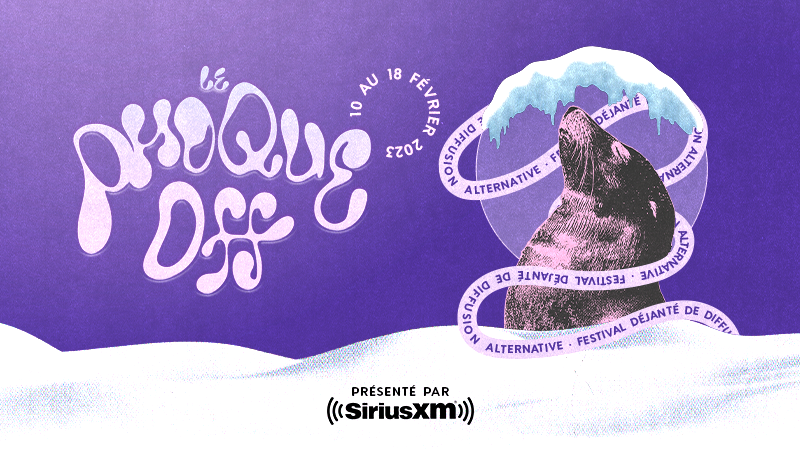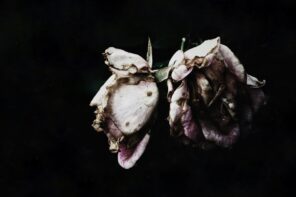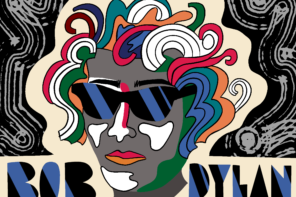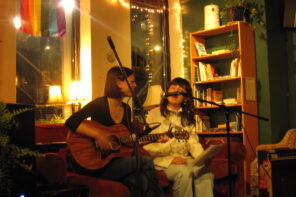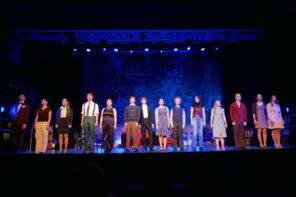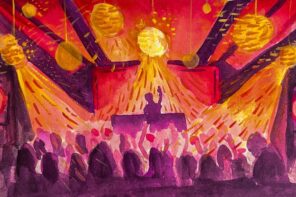Kicking off yesterday in Quebec City, Le Phoque OFF Music Festival features a plethora of fantastic artists. The abundance of indie, punk, and experimental musical talent will definitely provide some electric nights, and for those unable to attend, there will also be a series of 20-minute Metaverse shows available beginning February 21st. Music festivals have a distinct ability to create unique and immersive experiences, as they blend together music from different genres and cultures in a fast-paced, interactive setting.
At Le Phoque OFF, the range of artists is especially diverse, and I was lucky enough to speak with two artists who will be performing at the festival: Alex Edkins, the guitarist and lead vocalist of Canadian trio METZ, who are performing on February 11th as part of their tenth-anniversary international tour, and Maryze, a queer bilingual singer-songwriter who makes haunting alternative-pop tracks that blend elements of horror with electronic, synth-based backing tracks (and some more acoustic, vocal-based tracks as well!).
Interview with Alex Edkins of METZ:
I know that you and Hayden (Menzies) met in Ottawa before the band fully formed in Toronto – how would you describe the difference between the punk rock scene in Ottawa vs. that of Toronto, and which would you say has been a bigger influence on METZ’s music?
They’re very different, but I’ll say this. The Ottawa scene is what made me fall in love with music. I met incredible people there, and we were all just really passionate about this hardcore stuff that we were discovering together. There are a couple reasons why I moved to Toronto – you know, it’s definitely kind of the epicenter of music in Canada in a lot of ways. It was great to experience something new and be around even more awesome stuff. Ottawa was really important to, you know, getting hooked, and then I just happened to meet more musicians and like-minded people in Toronto, so I can’t really compare them; they’re both really important to me.
When it comes to a performance like the upcoming Le Phoque OFF Festival in Quebec City, how does an opportunity like that compare to performing back home in Toronto?
It’s really just a city that we haven’t been to in a while. You know, with festivals, and arts funding, it’s always great when there’s an interesting mix of music. We’re starting to see it more and more I think in certain places – Montreal, Quebec (City) – diverse shows that are clearly booked by someone who has a passion for music as opposed to thinking about the bottom line only and booking the biggest acts they can get, so I’m always excited to be part of a festival like this, where it’s for art lovers, by art lovers.
Is there a way you get into the right headspace for a performance, and do you have any pre-performance rituals?
I mean I think it depends on the show – you’re a well-oiled machine, but if it’s a one-off like this, you know, it depends – we got together last night to run things, and work things so we can deliver the best show we can. But I’m kind of useless before a show – I’m not good at small talk, and I need basically to shut off a little bit and have some quiet time… But after the show, when you (have the) adrenaline and you’re feeling great, then that’s a totally different person you’ll see. A lot of musicians have a little bit of a ritual before, and for me, it’s just to get a little quiet time away from everything.
For a lot of punk and hardcore vocalists, there’s kind of this second gear you need to tap into for a performance – obviously, the vocal performances are very effort-intensive. Do you feel like you get that extra adrenaline rush when you get on stage for a live performance, especially given that METZ’s music has a very intense vibe to it?
Yeah, it’s a bit of a switch that gets turned on for sure, and I don’t know why that is – it’s always been that way with the three of us. We have this chemistry that just goes boom. We’re very physical and emotional players, and it is an intense thing for us and for the crowd. There’s nothing that goes into that other than that, it comes from somewhere, and I couldn’t tell you where.
One thing I was also curious about is the solo project you worked on – within Weird Nightmare, there were a lot of joyful and bright sounding tracks, and I’m going to resist the urge to compare that project to METZ’s albums, because they’re two separate entities, but can you just take me through the process of putting together that album and achieving the sonic and stylistic vibes you were going for?
I’ve always loved pop music. During the pandemic, this was something I did because we were off the road, not knowing what was around the corner. Everyone felt the same way you know, this scary kind of feeling, so I think it was a comfort for me to make those songs, and I also wanted to be a comfort to other people too, but it was about doing what I wanted to do, and it succeeded because it was like a really fun project. It was kinda nice (to have an) open-ended project, really doing it for the fun of it and the love of it, and it got bigger than I could have imagined, and it’s been really cool, to the point where I’m honored, so it’s just one of those happy things that helped to feel sane during the pandemic, and it’s worked out in a cool way. There’s always been little melodic hooks in METZ’s music, but this was just kind of one of those instincts that I’ve always had.
To me, visual media can really bring out an additional dimension of a musical project. I know METZ has done a lot of work with Scott Cudmore – do you have a favorite collaboration you’ve done with him, or is there a moment in filming one of your music videos where you were particularly impressed by an idea he brought to the table?
Yeah, I mean, I like all the videos we’ve made. We just are lucky enough that these really talented directors agree to work with us, you know? We’re always down with it completely, and it’s their creative reading on what we’re doing, right, so it’s always really exciting to see. Even on the last record, there’s videos for “A Boat to Drown In,” “Pulse,” where it’s just all epic. He just blew our mind. We’ve been long-time friends with Scott Cudmore, who’s super gifted. He made our most-watched video, and just an absolutely crazy, crazy thing to witness. It makes the song even more, sort of what you were touching on, how when they work together it can be even more powerful.
Off of the last question, what’s the importance of pairing visuals like music videos, album covers, and other forms of art with the songs you and your bandmates create, and do you think there’s a special significance within the punk rock genre of pairing these visual media with music?
I mean, we take the album covers very seriously. I’m a record collector, and the record cover intrigues me if it’s beautiful. I’ll look around, and I’ll see what it’s about – I’ll see who produced it, and what label it’s on. And, of course, making a cohesive package, if we’re talking a record, a video, an album, or to take it as far as t-shirts, and merch, we want it all to be this narrative, if you will – this world, where we’re creating this bigger thing. I absolutely geek out on it, so I’m super serious on choosing it and getting it just right.
I’m always interested in where musical artists find inspiration, and I’m sure you’re asked all the time about your biggest punk inspirations. Given that you’re signed to Sub Pop, you probably get asked about Nirvana’s influence on you a lot, but I was actually curious if there are any bands or musicians outside the realm of punk and other forms of rock that you feel have been influences on your music. I know you’ve mentioned in the past that Wu-Tang Clan influenced your childhood, specifically their track “Can It Be All So Simple” – are there any other bands or artists outside of the punk realm that you cite as big inspirations to your music?
I think there’s so many, but one that I’ll say may be a surprise to people – within my family, I have two brothers, the go-to band would be “The Band.” My dad loved the first two The Band records, and we watched “The Last Waltz,” and I think it kind of got me hooked by rock and roll, and I still love those records, but they’re certainly outside the realm of punk. That’s one of them, other people (in our band) would also say The Beatles, but The Band was definitely in my household.
I’m always curious about how the songwriting process goes for bands – when you’re writing new stuff, do you feel like the ideas ever get jumbled, or is it a more cohesive process than some may think?
Sometimes it’s easy and sometimes it’s hard, like the “too many cooks in the kitchen” idea. We have a pretty solid shell or blueprint of an idea with the drum machine, bass, and guitar being layered, and we’ll sit down and play it live to see what’s working. That’s our jump-off point, where I’ll bring in a demo, so that way we don’t really start from scratch. It has happened where we start with nothing in the room, but that’s not really how it works anymore. We’re three different people with three different interests, but I think that’s the real positive. We are three different people that will leave their mark on the song in one way or another, and over the years we’ve defined this distinct sound that you can hear.
Ten years ago, when asked about the process of recording METZ’s debut album, you said “there was no one influencing the music we wrote or the way we produced it, other than the three of us.” A decade and many subsequent releases later, as METZ has grown in popularity and collaborated with more and more people in the music industry, would you say that statement has held true about your work to this day, and do you feel like you and your bandmates have always had the full-fledged creative freedom to make the music exactly the way you envision it?
Yeah, 100%. Sometimes, I wonder if we should have someone come, you know, write us a hit, but thankfully, we don’t get any outside pressure from our label, and we are left to our own devices, for better or for worse. We feel fortunate that that is the case, and the landscape can be pretty hard to navigate sometimes, but I think by sticking to our guns and our hearts, I think the proof is in the pudding. You have the three of us being together for ten years, and we’re still making what I think is pretty uncompromising (music), and it satisfies something within us. I saw this show the other day where a chef was talking about how she makes food for the community. It kind of resonated with me, because I do this for my bandmates, but I also do it for the punk community that gets it, and I didn’t always recognize that. So it’s 100% controlled by us, and I think it’s gonna stay that way.
I think that in today’s world, there’s such a huge emphasis on the idea of taking a traditionally safe path in life, like going to work a desk job that might not necessarily be the most fun, or the thing you’re most passionate about. Do you have any advice for aspiring artists or people who, in general, are struggling with which path to take in life?
It’s something where it can be hard to know, but being basically the CEOs of your own company, aka this band, that’s definitely a perk. That’s not something I ever anticipated doing, it just kind of happens that way now, where if you want to have a career in the arts, you gotta wear a lot of hats. That’s something that surprised me, but it’s something we’ve gotten used to. The idea of a safe career might be a bit of an imagined thing anyway. You could have a desk job with benefits and a salary, but that can be taken away from you too. At the heart of it for me, it’s about spending each day doing the thing that brings you joy. The thing that you can be happy having done every day for your life, because life is short, and I’m old, I’m starting to feel it, but I do really do the thing I love full time. What is it that you want to do on this planet? Don’t waste a day. When I’m doing this, I’m never wasting my time. I’m not working for someone else, I’m working for myself, and I can feel good about that.
Interview with Marzye:
How did you get started in the world of music, and more broadly, what should the world know about you as an artist and as a person?
I got involved with music really early. Pretty much as long as I can remember I’ve been doing music in some way. I started writing songs as soon as I could write essentially, and my parents put me in singing lessons and piano, and then I was in jazz choir in high school and joined my first band when I was 18 or 19. I grew up in Vancouver and went to UVic, and that’s when I first really started getting involved in the music scene, then I moved to Montreal 5 years ago. What I want the world to know about my art and about me as an artist, is (I hope there is) some kind of familiarity for people to feel, and a sense of a community for people. I think for a lot of us growing up who loved music, certain music made us feel less alone, so that’s sort of the cheesy response, but truly to give people a sense of familiarity and belonging with their experiences.
I know your debut album “8” was written over quite an extended period of time, with different songs coming from different periods of your life. Does releasing a project like that, which is kind of a synthesis of so many years of lived experience, feel like a weight is being lifted off your back, considering how long you were working on some of those songs for?
Yeah, definitely. I think a lot of the songs were quite personal, so keeping them secret felt like a bit of a weight. Putting them out there felt very vulnerable, and it was like, there’s no turning back now, because when you’re working on music for so long, you can keep tweaking things, but once it’s out there it’s out there. It was a bit of a relinquishing of control as well, which is good, because otherwise you’re finicking things that don’t really need to be tweaked, and art needs to be put out there at some point, so it did feel like a release in all the senses of the word.
And do you feel like there’s a different type of that “release” from a live performance as opposed to working in the studio and putting the music out there?
Yeah, I think live shows are definitely more instant… I don’t know if gratification is the right word, but it’s an instant connection with the audience. It’s very euphoric afterwards, generally, if everything goes well during the show. With putting music out there, that release is a little different, because in some ways, it feels like you’re putting out your baby, and you want to protect it in the world, and you want to put out these songs that form a bit of a spider web of your experiences, but you never know how people are going to receive it. It’s a little more complicated I feel, putting out a product like an album to the world, because it’s obviously very vulnerable.
There’s definitely some vulnerability to performing in front of an audience as well – do you have any routine that you put yourself through before you go on stage, or even in the days leading up to a performance, to get in the right headspace for that performance?
I definitely like to practice leading up to a performance and make sure everything feels comfortable. I really don’t like leaving things to the last minute when it comes to getting ready for shows so I try to be on top of it. On the day of, when I was starting out, I would get very anxious, and my whole day would be about that anxiety leading up to the show, whereas now I can just live my life and have a normal day and not be worrying about what could go wrong the whole time. I find it more relaxing to not worry about the show on the day of, and there’s no real point in worrying beforehand if you are prepared and have practiced.
Do you have any one, or several, artists that you would say influenced your style the most? I know you’ve mentioned in the past that Blink-182 and Fall Out Boy, as well as some other pop punk bands – would you say they’ve been huge influences on your music?
Yeah, I think so. I think in terms of writing, Fall Out Boy especially, because the bassist, Pete Wentz, who writes the songs, is a poet and a writer as well, and I studied poetry and creative writing at university, so I appreciate someone who is bold in their writing choices in a genre that favors simplicity. Not that pop punk is always simple, but usually the lyrics are a little more straightforward, and I know a lot of people think Fall Out Boy is kinda corny, or a little flowery, which they are, but I appreciate a writer who isn’t afraid to embrace that overly emotional side. If it’s real and if it’s true, I think a lot of people can connect to that. Lady Gaga, for me, was also one of the first rays of light in pop music where I found someone was really embracing who they were, and their weird side, and making really catchy pop music, but in a way that made sense to them.
I don’t know if you’ve seen any of Fall Out Boy’s longer form video projects before, like “The Youngblood Chronicles” for Save Rock and Roll, or even their older music videos, but I feel like there’s a lot of pushing the envelope and making film components that aren’t necessarily “mainstream pop” to go along with their music. I notice some similarities in your music videos, like in “Emo” and “Female Brad Pitt,” there’s the idea of wanting to push the envelope and think outside the box with video accompaniments. Is that something you think about in terms of taking inspiration from other artists?
It’s funny that you talk about Fall Out Boy’s video projects, because I really loved their earlier videos, like for “A Little Less Sixteen Candles, A Little More Touch Me,” with the vampire aspect, because I love horror, and just the retro style, they had a lot of 80s influences in their music videos, and I really appreciated that aesthetic sensibility and the cinematic aspect. Obviously, I’m working with a much smaller budget in my music videos, but I always try to get a cinematic element or something interesting, because I think visuals are really important to accompany music. Growing up with that theatrical thing with Fall Out Boy, or Panic at the Disco, or Lady Gaga, kind of the golden age of music videos, I love a good 8-minute video that has interludes and stuff, I think those are really fun. I think the “Bad Romance” video and the “Telephone” video, with the “Telephone” video being very Tarantino-esque, I enjoyed that.
How does the genre of horror serve your music, and has horror always been something you felt very connected to and wanted to work into your music?
I was in a synthpop trio called “Spectregates” that was very, kind of spooky, and I really enjoy projects that fully dedicate themselves to spookiness. It depends on who you are as an artist but I like that dark element to music. I think it’s really fun, like not only can it be dark and intense and scary, but it can be really fun to explore those things. And then there’s so much you can do, music video-wise, with horror accompaniments. In terms of horror directly influencing music, I think there’s a lot of great horror soundtracks, and a lot of great 80s synth classics. I don’t know if you’re a horror fan, but if you’ve seen the movie “It Follows,” the soundtrack is really great, and when the soundtrack becomes almost like a character in the movie, I think that’s the best. The embodiment of horror in music is a really interesting concept to me.
I also think about the reverse of that a lot of the time, like in horror movies and TV, you see sound being used a lot of the time to increase the terror of the scene and make it a more visceral experience for viewers. Do you think the same concept applies to music, and that having that horrorcore sound in music can awaken a more visceral response for your listeners?
Definitely, I mean, I think in horror it can be cheap, right, like if something is not that scary and you’re just using noises to evoke that fear, and if you’re watching with the sound down it’s not even scary. I like to be intentional when choosing sounds and synths, especially with my voice, because that’s what I have the most experience producing, just using weird effects and pitching stuff down to sound groggy and scary, or the opposite, and using auto as well to make things sound really surreal.
You mention producing and working with your own voice, and in the past, I know you’ve spoken about wanting to learn more about that solo production stuff as time goes on. Having collaborated a lot with Solomon K-I on these production projects, and working on production over the course of creating these long form musical works, do you feel that you’ve reached a point where you feel very confident in your solo production skills, and is there a tool that you would tell aspiring artists is the most important production skill to learn?
I think it’s really valuable to just always be in the room with whoever you’re working with – I learned so much from just being around it, and being like “what does that do, what are you doing, how did you make that sound that way?” I think I pick up a lot from just seeing it and asking a lot of questions. Immerse yourself as much as possible, if you can be around it. I like to have quite a bit of control over the production, even if it’s not all mine, because I think everything has to tie in together. I also think having someone who can be a teacher (is important). It depends on your learning style; I learn better hands-on than I would just reading an article. Even watching a YouTube video is great to just be in the moment and try it out, and it takes away from how complicated it feels. I’m going to be a constant student my whole life when it comes to production, and I think most people are. There’s a couple songs on the album that I produced by myself, but those are the ones that are either just vocals mixed together or just me on piano, so production remains a bit of wizardry to me, but I do feel a lot more confident now. It will seem like outside jargon, but it’s really not as complicated as it may seem at first.
Do you notice a distinct difference in your songs that were written for “8” a long time ago versus the more recently developed ones? Was it easier as time went on to write those songs?
I think that strangely enough, the older songs were the ones that almost stayed truer to themselves. When I decided to put them on this album, I thought maybe I should go back and revisit it, wondering if I should add certain elements, but I realized that they were the way they needed to be, which is something I’ve learned over time too. Sometimes the rawest idea is the closest to how it needs to sound, and if you pick it apart for too long, it just becomes something else that it’s not meant to be. The newer ones are the ones that went through the most mutations, because I had more tools at my disposition, but it was a cool experience to just be like, “Oh wow, these songs that I wrote when I was 19, 20, are just ready to go, and actually really strong songwriting.” I was kind of impressed and also like, wait where did that go, I feel like I don’t write as well now. But yeah, that was neat, to just see that they’ve been there, waiting, ready to be put out into the world.
Do you ever feel like it was a different person who wrote those songs, looking back at them?
Yeah, I think it was also a much more tumultuous period of my life, and I think as most artists feel, when you’re going through more things, or a more difficult period, that’s when you have more to write about, because you have more emotions to put out there, and you’re asking yourself more questions. It still definitely feels like me, but it feels like this core of myself that I was trying to get back to on this album. I kind of wanted to honor that earlier songwriting style and those experiences that shaped me, because even if they were a long time ago, they still contribute to who I am.
Having lived in Quebec City for a year, do you think there’s any special meaning for you coming back to perform there for Le Phoque OFF?
Definitely, I’ve performed with bands in Quebec City, and I’ve only performed there once as a solo artist, and that was before the pandemic. I was thinking about that earlier, how it’s going to be really cool to perform some songs that I started writing there 8 years ago.
What upcoming performances and projects do you have coming up?
So there’s Le Phoque OFF Festival, and then I’m coming back to Montreal and playing this anti-Valentine’s sad song cover night, which is gonna be really fun, at the Diving Bell. Then I’m going to have some DJ gigs in march, and then I’m actually going to Los Angeles to work on music for a while, so I’ll be there for April to focus on my next project.
In today’s modern, business-oriented society, there’s a huge emphasis on traditionally safe career paths. I personally love writing, and produce some music myself, and I love these creative projects, but at the same time, I am a business student pursuing a traditionally “safe” path, and in all likelihood, I’ll end up working a job where I don’t have as much time to pursue these creative endeavors. Do you have any advice you’d give to people who are debating and trying to make that choice between a traditionally safe path or pursuing a more creative passion?
Simply put, the money is not worth your pain, and you will slowly die if you end up at a desk job if that’s not what you want to be doing. I did that for a few years, working as a journalist, and I really tried to get into it, but I was unhappy the whole time, and everyone else at the office told me that they had dreams that had been crushed over the years, and that you can always come back to an office job, but you can’t always come back to a dream.
***
Catch METZ and Maryze in action at Le Phoque OFF festival, running until February 18th in Quebec City! A special thanks to Alex Nitsiou and Raison d’etre Media for making this article possible.

